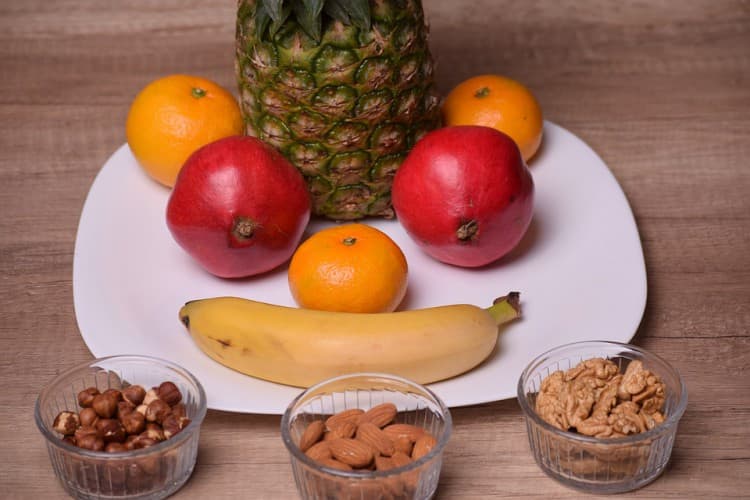
Fruit contains lots of nutrients that are healthy and essential for proper body function, however they repeatedly get a bad reputation due to their sugar and carbohydrate content.
Let’s start by thinking about what exactly is in fruit… fruit is comprised mostly of vitamins, fiber, minerals, water, antioxidants, calories, carbohydrates, and sugars.
Examples of common vitamins in an average piece of fruit, for instance an apple or banana, are vitamins A, B, C, E, & K.
Examples of common minerals in that same piece of apple or banana are potassium, calcium, phosphorous, magnesium, and sodium.
And of course antioxidants are what help protect our bodies from damage from free radicals; this means antioxidants may help boost our immune system, prevent atherosclerosis (blood vessel disease), and various forms of cancer. Antioxidants also help maintain healthy eyes, skin, and cognitive (memory) function.
So what about the fiber in fruit? Fruit is loaded in fiber! Fiber, especially soluble fiber, has lots of great properties including: helping to prevent or relieve constipation, lowering the risk of heart disease and diabetes by lowering cholesterol and blood glucose levels, and helping maintain a healthy weight.
Overall pros of fruit: they come from plants and are not processed, they are generally healthy with lots of vitamins, minerals, and antioxidants in them, they are relatively quick and convenient, they are easy to prepare and portable, and they are loaded in fiber!
Now moving on to the specifics of why fruit can get a bad reputation sometimes…
Carbohydrate content in fruit: In general, most fruits have what is called a low-glycemic load — meaning they do not have a huge impact on your blood sugar levels. But if you’re limiting your carbohydrate intake to a moderate amount in attempt to lose weight, say 100 grams a day, then fruit can quickly take up a large percentage of that allowance. For instance, if you eat one medium banana (27 g) and one medium apple (25 g), that’s already 52 g of carbohydrates, more than 50% of your daily total allowance of carbohydrates. Fruits that are the lowest in carbohydrate content include: watermelon, strawberries, peaches, and honeydew. Fruits that are higher in carbohydrate content are: bananas, mangoes, oranges, and cherries.
Sugar content in fruit: Fruit contains a simple sugar known as fructose, which is only metabolized by the liver. This is unique in that most simple sugars, such as glucose, are sent to our muscles, brain, and other organs to be used as energy, however fructose is not. This can have a negative effect if our liver already has ample energy because it basically then turns that fructose into stored fat to use at a later time as needed. However it should be noted that the rate at which fructose from a piece of fruit hits the liver is much slower compared to the rate at which sugar from a soda or candy bar hits the liver. Fruits that are lower in sugar content include: raspberries, blackberries, cranberries, and lemon or limes. Fruits that are the higher in sugar content are: bananas, grapes, tangerines, and mangoes.
Take home point: There are a lot of healthy benefits from eating fruit so if you are going to cut down the amount of carbohydrates and sugars in your diet, start with foods that are more processed first such as pastas, breads, sugary beverages, and snack cakes. Fruit may not necessarily be a “free food,” but having fruit daily in moderation while trying to lose weight is great specifically due to all the nutrients, fiber, and antioxidants contained in them.
